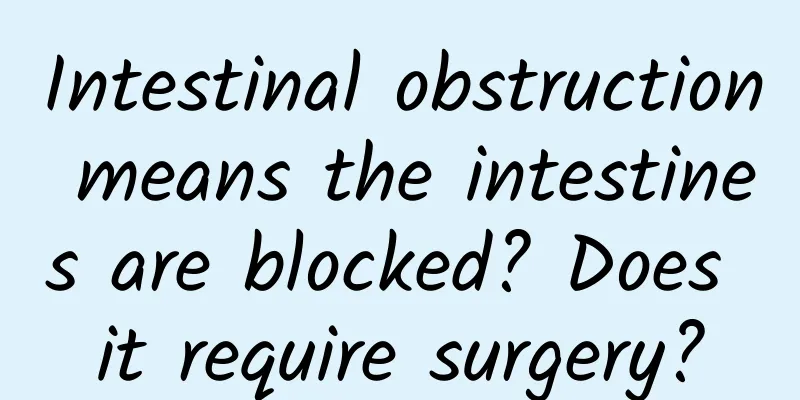Intestinal obstruction means the intestines are blocked? Does it require surgery?

|
Author: Jia Junfeng, Chief Physician, Beijing Rehabilitation Hospital, Capital Medical University Reviewer: Yao Shukun, Chief Physician, China-Japan Friendship Hospital When the intestinal contents cannot flow normally due to various reasons, blockage or movement disorder occurs, it is called intestinal obstruction, which is a common intestinal disease. Figure 1 Original copyright image, no permission to reprint 1. What are the causes of intestinal obstruction? Intestinal obstruction is generally divided into three types clinically: mechanical intestinal obstruction, dynamic intestinal obstruction and vascular intestinal obstruction. There are many causes of intestinal obstruction, and different causes cause different types of intestinal obstruction. The most common one is mechanical intestinal obstruction. There are three causes of mechanical intestinal obstruction: intestinal wall factors, extraintestinal factors and intraintestinal factors. Diseases of the intestinal wall itself, such as polyps, tumors, or intestinal inflammation, can narrow the intestinal cavity. Diseases outside the intestine, such as compression by abdominal tumors, inflammatory adhesions, or intestinal torsion, can compress the intestinal cavity, causing the intestinal cavity to become relatively narrow. Problems inside the intestinal cavity, such as large fecal stones, foreign bodies discharged into the intestine, etc., can block the intestinal cavity and cause intestinal stenosis. The above are common causes of mechanical intestinal obstruction. As the name suggests, dynamic intestinal obstruction means that the intestinal peristaltic function is affected. There are two situations. One is that the intestinal smooth muscle spasms, causing the intestinal cavity to narrow and affecting the movement of intestinal contents, such as poisoning; the other is that the intestinal tract is paralyzed, such as peritonitis, major abdominal surgery, abdominal trauma or retroperitoneal hematoma, etc., which leads to intestinal paralysis and weakened peristaltic function, and cannot make the intestinal contents move forward normally. Vascular intestinal obstruction is mainly caused by mesenteric vascular diseases, such as mesenteric venous thrombosis, mesenteric artery embolism and other diseases, which lead to intestinal blood flow disorders and thus cause intestinal obstruction. 2. What are the symptoms after intestinal obstruction? Intestinal obstruction usually first causes abdominal pain, followed by abdominal distension, nausea and vomiting, and cessation of flatulence and defecation. Pain, vomiting, distension, and constipation are the four typical clinical symptoms of intestinal obstruction. Figure 2 Original copyright image, no permission to reprint If these four symptoms occur, intestinal obstruction should be highly suspected, and the diagnosis can be confirmed by combining medical history, imaging examinations, and laboratory tests. It should be noted that different types of intestinal obstruction have different symptoms of different severity. Sometimes the initial symptom of intestinal obstruction is abdominal discomfort, which gradually turns into abdominal pain. Some cases start with abdominal pain. Simple intestinal obstruction often manifests as paroxysmal abdominal pain. If blood flow obstruction develops into strangulated intestinal obstruction, it will become continuous and severe abdominal pain. If you only have abdominal pain, you should not think of intestinal obstruction first. There may be other reasons, because many diseases can cause abdominal pain, such as cholecystitis, appendicitis, peritonitis, gastroenteritis, etc. For abdominal pain caused by intestinal obstruction, the site of the lesion is usually the most painful part. 3. How to treat intestinal obstruction? It is divided into two methods: conservative treatment and surgical treatment. Conservative treatment is the first choice for most cases of intestinal obstruction. Conservative treatment first requires fasting and abstention from water, and neither eating nor drinking. A gastric tube is placed in the stomach for continuous gastrointestinal decompression, which is the most basic treatment. At the same time, water and electrolytes must be supplemented, that is, fluid therapy, which is a very important treatment method in conservative treatment. Nutritional support and infection prevention and treatment are also required. Because the intestinal cavity is blocked, the proximal intestinal tract will expand, and a large number of bacteria and toxins in the intestine will be absorbed into the blood along the intestine, so infection must be controlled in the early stage. There are also traditional Chinese medicine therapies, rehabilitation therapies, etc., which are increasingly used in the conservative treatment of intestinal obstruction and have achieved good clinical results. For intestinal obstruction that cannot be relieved by active and necessary conservative treatment and whose symptoms gradually worsen, surgical treatment should be taken in a timely manner. 4. Which intestinal obstructions require surgical treatment? Strangulated intestinal obstruction caused by various reasons; tumor-induced intestinal obstruction; congenital intestinal malformations such as congenital intestinal stenosis and intestinal atresia; symptoms that do not improve after conservative treatment and further worsen, these four situations require surgical treatment. Regarding surgical treatment, there are two methods: laparotomy and laparoscopy. Regarding the surgical method, this question is more professional, and the surgical method is determined according to different causes and conditions. For example, adhesive intestinal obstruction is to release the adhesion band and loosen the adhesion of the intestine to relieve the intestinal obstruction; for tumor intestinal obstruction, tumor resection, intestinal anastomosis or intestinal fistula should be performed; intestinal obstruction and intestinal necrosis caused by mesenteric vascular embolism also require intestinal resection. |
<<: Acne is not always caused by puberty, it may also be Malassezia folliculitis!
>>: The incidence of onychomycosis in diabetic patients is as high as 40%! Pay great attention!
Recommend
What you should know about the flu virus
It is the season of transition from winter to spr...
Is the second menstrual period after childbirth on time?
Postpartum women need to pay attention to changes...
What does it mean when a woman dreams of fighting?
War can expose the ugly side of human nature. Man...
It hurts like a needle prick down there
The vagina is part of the female reproductive org...
There are more than 12 million patients with heart failure, and hypertension is a high-risk factor
Today is the ninth National Heart Failure Day. As...
Can I breastfeed if I have a fever during lactation?
The lactation period is a very important period, ...
What kind of exercise can slim your face?
Every female friend wants to have a beautiful fac...
What are the symptoms of abdominal effusion in women
It is said that women are made of water. In fact,...
Does Tongcao help to increase milk production?
Tongcao is a traditional Chinese medicine. As we ...
How to treat postmenopausal endometrial hyperplasia
Many women will experience some uterine diseases ...
What are the symptoms of gynecological inflammation after fire therapy?
Fire therapy is a traditional Chinese medicine ph...
Why is itching on the vulva?
The vulva of female friends is actually very susc...
The pregnancy test stick is a horizontal bar after 10 days of delay
Nowadays, technology is more advanced. Even if a ...
Why do I feel tired when my period is coming?
In real life, women are prone to drowsiness and e...
How to use the dysmenorrhea patch? Pictures
The most painful thing for girls is menstrual cra...









